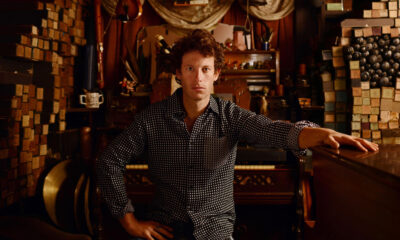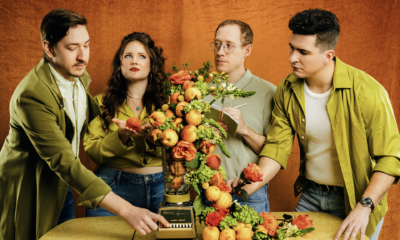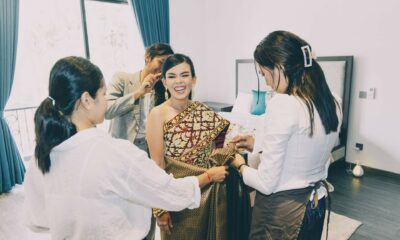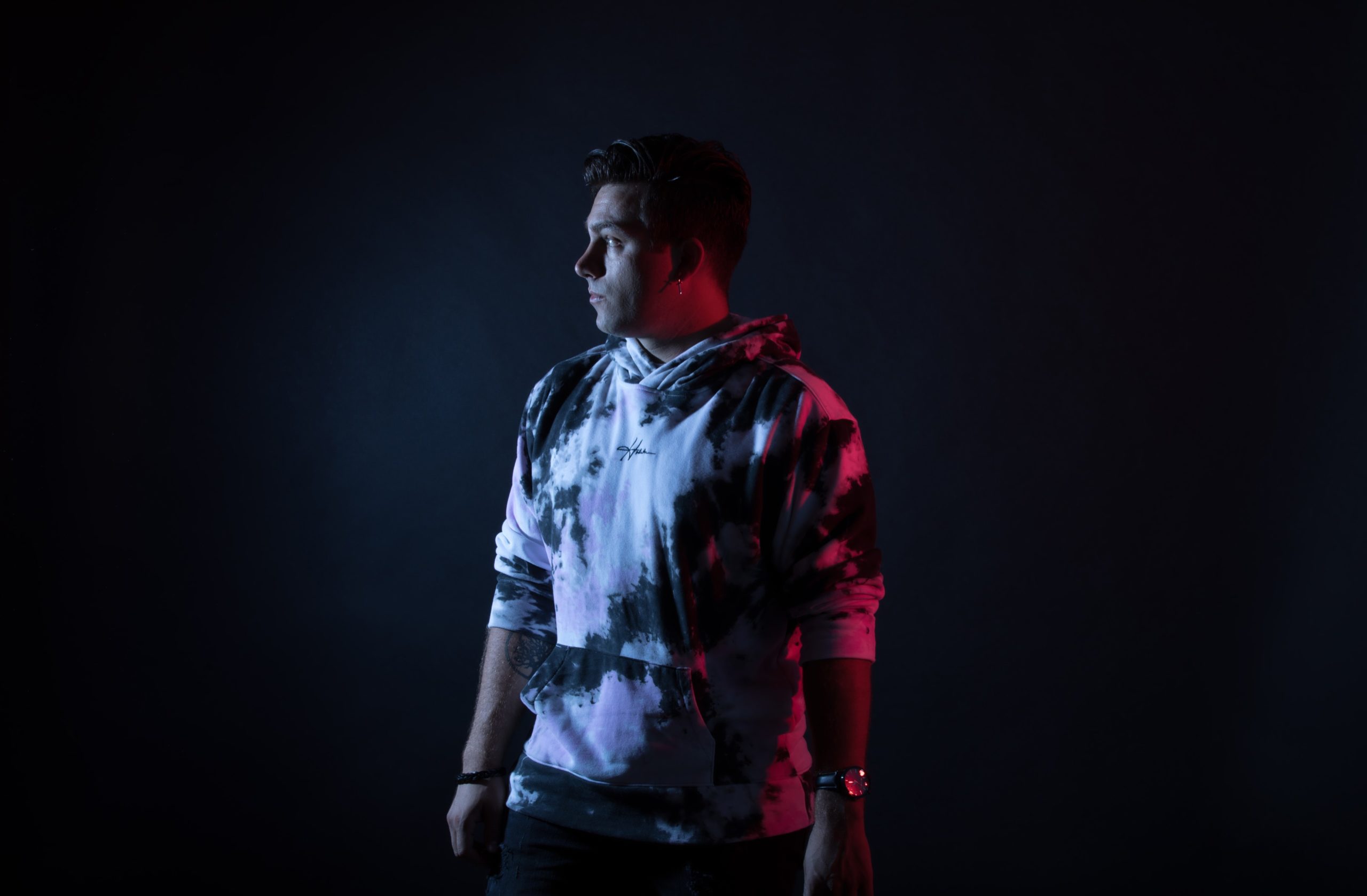Interviews
Donny McCaslin Discusses ‘Blow,’ His Berklee Education, Working with David Bowie, and Upcoming Plans [w/ Audio]
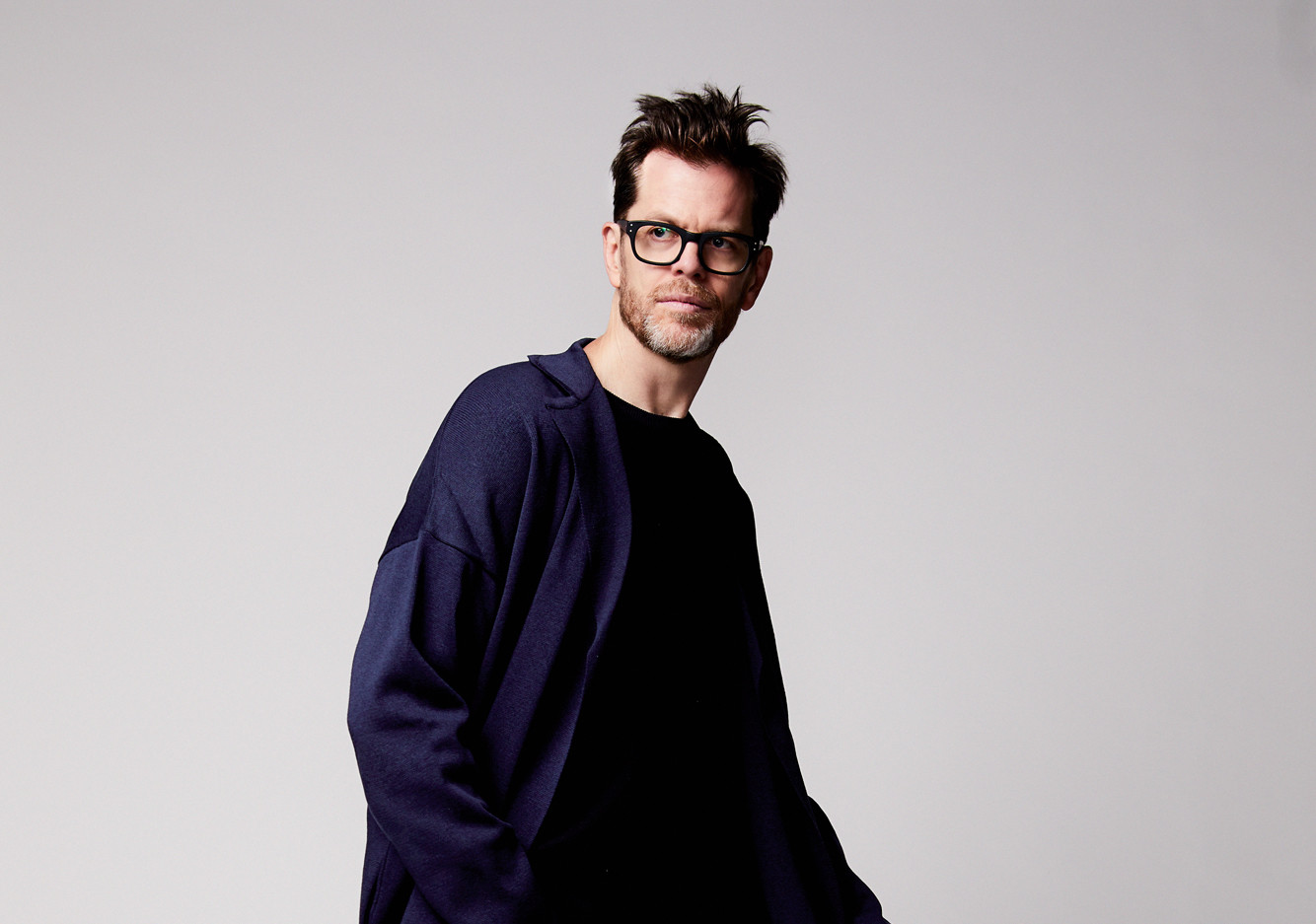
Days before his January 2016 death, David Bowie released his final album, Blackstar. While the record represented an endpoint for the legendary artist, it also marked a new beginning for Donny McCaslin.
Blow. is the latest studio album from the Berklee College Of Music graduate. The project’s first single “What About The Body” is a sizzling cut that blends alt-rock, jazz, and politically suggestive lyrics from singer-songwriter Ryan Dahle (Limblifter, Mounties). Supported by a top-notch cast of musicians that includes Sun Kil Moon’s Mark Kozelek, Blackstar bandmate Tim Lefebvre and fellow Bowie collaborator Gail Ann Dorsey, McCaslin applies his jazz roots in thrilling ways throughout Blow.’s hour runtime. Vocals also play a crucial role on Blow., in ways that they haven’t previously in McCaslin’s career.
I had the pleasure of interviewing Donny McCaslin by phone in October 2019 about Blow., what led up to this point of his career, and what else is coming up for him in the near future. More on McCaslin can be found online at www.donnymccaslin.com, while audio from the full chat is embedded above via the Sax&Violins SoundCloud channel.
So how long did you spend making Blow.?
Donny McCaslin: “Four days in the studio here in Brooklyn and then there were various days of overdubs that happened over the course of, let’s say, the next couple of months after the initial four days of recording. Leading up to the recording I had previously been, you know, on the road… on the stage… and whatnot. So we had some of it in place and some of it was more, kind of worked out in the studio.”
The first single, “What About The Body,” when in the process of making the album did that one come up?
Donny McCaslin: “That was near the end, actually… Tim Lefebvre sent me an idea that I was immediately enamoured with and I worked on it for a while and in the end sent it to Ryan Dahle and he added the vocal melody and the lyrics…”
The album notably has your buddy from the Bowie days, Gail Ann Dorsey on there. Did you know all along that Gail Ann was going to be on the record or is that just something that happened by chance?
Donny McCaslin: “Well, I had been interested in working for her for a while. I met her on a tribute to David Bowie, Celebrate Bowie, that was done in New York and I was just so taken with her. You know, what a tremendous talent… I was really taken with the depth of expression she has as a singer. And as an instrumentalist. I was just really drawn to her and I think at one point we talked about her writing lyrics potentially to a song and that didn’t really come to path. She got busy and we ended up sort of having that be an instrumental piece. But ‘Eye Of The Beholder,’ that song came together and it just felt like she would be the perfect person to sing that. So I was just thrilled that she could do it and just absolutely love her performance on it.”
We have a mutual contact in Henry Hey, who I know that you have filled in for and you’ve swapped gigs over the years and he’s another person that worked with David. So I’m curious if you’re, just in general, in touch with a lot of people from David’s band? Like, it’s almost like a fraternity of sidemen and sidewomen who know what the deal is and they all are friends for a long time because of that?
Donny McCaslin: “Well I think that is a dynamic that happens with Bowie alumni, and it’s an honour to be a part of that. But actually I met Henry when he first moved to New York from Northern Texas State when he first moved to New York. I met him not too long after he moved to town and we started playing together here and there. And he was the one though, when I was talking about the Celebrating Bowie gig, he was the musical director of that and that’s where I met Gail… Henry was the one who put that gig together and so we did play music together for many years and it was just serendipitous that he was working with David and was the music director of Lazarus and then Blackstar happened and being able to connect on some of the music of Celebrating Bowie.
Henry did a great job. He’s a great musician and his gigs are always really fun and on a high level musically. On those gigs, I had the chance to connect with Mark Plati who produced the drum and bass record Earthling… and Zack Alford, who I actually went to college with many years ago who I hadn’t seen in many years. The list just kind of goes on and on. All these great people who worked with David.”
Going back to a couple of decades, before you first worked with David, you went to Berklee and I’ve heard a mix of things about people who go to Berklee. Some people love their time there and other people kind of drop out and they are proud that they took the courses, but they don’t really think of themselves as an alumnus. Which one are you closer to?
Donny McCaslin: “Well, I would say my experience there was very positive. I did stay there for four years and I had the opportunity to leave school early to go on the road but I knew I needed more time to matriculate and to practise and prepare myself. So, for me, it was a very positive experience. Surrounded by great musicians. Very eye-opening when I got there and it was an environment where I could really buckle down and work really hard and it was that school that I sort of connected with my first touring gig, which was playing in Gary Burton’s band, and Gary was a professor at Berklee at the time that later went on to be the Dean of Curriculum. In my senior year of college, I joined his band and started touring, so I was fortunate to be in that environment and have that happen and spend maybe three and half years or so of touring with his band which was a great experience.”
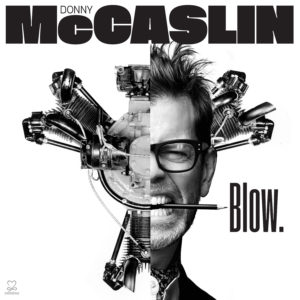
Based on the fact that you are still doing it decades later, obviously you are a success story of Berklee, but who are some of the other people that you went to school with there that were success stories or proven to be success stories in the years since?
Donny McCaslin: “Well, in terms of people who I was crossed with, there was Kurt Rosenwinkel, he is a great guitar player. We shared some time together in Gary’s band and he’s gone on to have a tremendous career. Another guitar player, Wolfgang Muthspiel went to Berklee when I was there. He also played in Gary’s band. A great guitar player and composer. Roy Hargrove, who passed away not too long ago tragically. A great trumpet player. Jeffrey Keyser, piano player… He was at Berklee when I was there. Jim Black the drummer, he’s had a great career. Somebody who I admire a lot. We entered at the same time.
Danilo Perez is an amazing piano player. He now actually teaches at Berklee. He has a global jazz institute. We entered school at the same time and we were friends and played a lot… I ended up touring with his band years later and having a great experience with him. Luciana Souza is a great singer from Brazil. She was a student at Berklee when I was there. She’s an amazing musician and composer. Laurie Kennon is a great singer… Antonio Hart, a great alto sax player. Sam Newson is one of the greatest soprano saxophone players in the world right now. He went to school with me at Berklee. Javon Jackson is a great tenor player. Todd Smith, a great tenor player who lives in Scotland and had a major voice in the Scottish jazz scene for decades… So yeah, I could kind of keep going.” (laughs)
I’m impressed that you knew all those names like that and I’m also surprised that I didn’t hear any names like Abe Laboriel Jr. or Stacey from the band American Hi-Fi.
Donny McCaslin: “I was graduating from the school when Abe started, so maybe I’m four or five years older than him, so I did actually meet him and play with him a bit, but we weren’t necessarily contemporaries at school. That makes me think of Lalah Hathaway. We were contemporaries and Lalah was tremendous and I enjoyed getting to know her a little bit in college.”
She’s somebody I had the pleasure of interviewing last year and it’s amazing that she’s not really coasting on her heritage or her last name. She’s genuinely a talent, so that’s really a great one to see. So, going back to you and looking at your career here, what does the next year or so look like for you? Are you touring in support of Blow.? Juggling sideman gigs?
Donny McCaslin: “There’s a couple of new singles and one actually features Gail, who we were talking about earlier, and it’s called ‘Head Of Mine.’ There’s a video and the full song and then a song called ‘Tokyo,’ so those recently came out, those two singles. So what’s coming up for me is, right now we are working on new songs that are going to be released next year and those have been recorded we’re kind of in the production stage on a group of songs, and I’m going to continue to mostly tour with my band.
We’re going to go to Europe in November for a couple of weeks and I’m going to play with Maria Schneider in New York City as a sideman within the next year… There’s more touring with my band so there’s been a bit of a lull this past few weeks and in the early part of 2020, but it’s a welcomed lull because I’ve been riding pretty hard for the last couple of years with everything that’s happened and it’s been tremendous. But I also need a little bit of a chance to kind of regenerate and focus on these new songs I mentioned and also start writing newer material.”
Well, your bio does call you a “jazz lifer.” What was the point in your career when you realised that you were going to be a jazz lifer and you wouldn’t have to play bar mitzvahes for the rest of your life?
Donny McCaslin: “That’s a good question. The way it’s felt to me is that just coming out of school, I was fortunate to have that gig with Gary Burton and that lasted for a little while, and when that ended I kind of went into freelancing and was living in New York City at the time. This feels like it’s been kind of a slow build. You know, year to year… The gigs that I was doing were getting better and better and I was able to say ‘no’ more and more to things that were not interesting artistically, and I don’t think there was a particular moment where I knew that I had sort of crossed that threshold. But it was more, as I mentioned, year by year and just feeling more and more that I was moving in the right direction… That I was able to play music that I really cared about at a higher percentage of the time, year after year until it just kind of completely took over. I’m really grateful for that and grateful to have the opportunity to do something that I care so much about and sort of put so much into.”
When I look at your tour routing and some of the releases that have come out on labels and all that, I see a lot more work in Europe and Japan than I do in the States. Is that something that you like? That you kind of have your identity and when you are overseas things are a little bit better?
Donny McCaslin: “Well I do love touring in Europe. It’s just tremendous being over there and it’s such a great place. And I love Asia too. I mean I have had periods where I have toured a lot in the U.S. and Canada, but I would say there is just more of an infrastructure over there for what I do. So there’s just more volume over there and that’s just the way it is.
I mean, I am with Blow. and with the new music, it’s in a way, it’s hard to categorise that in jazz music. I mean, it’s not something I think about a lot, but if we’re talking about that and talking about the idea of being a jazz lifer, I feel the way this music is going it feels more like a hybrid of art-rock and improvisation and there’s a real emphasis on songwriting and the lyrical content of the poetry. That combined with the orchestration around it and room for improvising and it feels like it’s a different kind of setting for at least this particular project and what I’ve done the majority of my career.
So part of that is also me playing in different venues. Venues that are more like rock clubs, for example, as opposed to jazz clubs and it’s not a black or white thing but now there’s more opportunities for me to play in those kinds of venues because the music suits that. So it’s been fun to explore that and see where it goes and to feel the freedom and following what your artistic vision is and not letting a genre… I mean, on one hand, we need to be able to define things and describe that to the listener and describe that to the audience. What can they expect? But on the other hand, it’s also exciting as an artist to feel like, ‘Wow, this is moving in a very unexpected direction.’
15 years ago if we were to have this conversation I would have not anticipated that I would have made a record like Blow. with all the singing on it and all the lyrical content and that I’d be performing all these songs where I’m singing some and it’s very different from the acoustic environment that I grew up in. But that’s part of the excitement and the joy of being an artist is coming across the unexpected and then following that to it’s fullest completion. It’s something really worth doing I think.”
When I look further into your discography and I see albums by Terence Trent D’arby and Tia Carrere, so you’ve definitely been on some interesting projects there. Are there any projects in your discography that especially stand out to you that people don’t talk about but they really should?
Donny McCaslin: “Ahh, let’s see… I’m so focused on the moment and what I’m doing right now, it’s not something I contemplate much… I mean of course the first thing that comes to mind is Blackstar but that is one that people are aware of and they talk about, of course. That was such a new and transformative experience.
I can think of my own project and records, maybe ones that stand out to me from certain periods, but in terms of the collaborations, nothing particular comes to mind except there was a band that when I moved to New York in my early years here, I connected with a group of kind of like-minded guys from my generation and we started getting together multiple times a week and writing original music and workshopping it together and it was Scott Colley on bass, David Binney on saxophone and initially Geoff Hirshfield then Kenny Wolensen on drums and then we started touring and made a couple of records and the band was called Lan Xang and we toured in Canada, we toured the West Coast.
It was really a formative experience for me because these guys were all very open-minded and very unafraid to take a bunch of chances and to play music that was very creative and very open and that was a really big deal for me to be able to do that and workshop that music, like I said earlier, multiple times per week and to be so inspired by these guys. They were my good friends, but also my contemporaries to learn from and see what they’re arriving and how they’re arriving for the group and all that, so that’s something that really had a lot to do with my growth.”
So any last words for the kids?
Donny McCaslin: “Let’s see, for the kids… Feed your creative imagination. Finding things to create to feed your creative imagination is a wonderful thing to do and I recommend it, whatever that is.”
-

 Hardcore/Punk5 days ago
Hardcore/Punk5 days agoHastings Beat Punks Kid Kapichi Vent Their Frustrations at Leeds Beckett University [Photos]
-

 Culture6 days ago
Culture6 days agoCirque Du Soleil OVO Takes Leeds Fans on a Unique, Unforgettable Journey [Photos]
-

 Alternative/Rock4 days ago
Alternative/Rock4 days agoA Rejuvenated Dream State are ‘Still Dreaming’ as They Bounce Into Manchester YES [Photos]
-
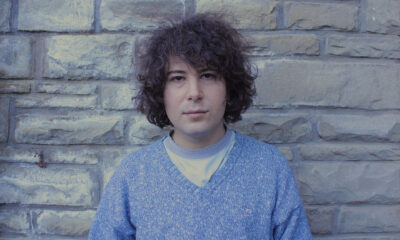
 Indie7 days ago
Indie7 days agoMichele Ducci Premieres Bouncy New Single “You Lay the Path by Walking on it”
-

 Culture10 hours ago
Culture10 hours agoDan Carter & George Miller Chat Foodinati Live, Heavy Metal Charities and Pre-Gig Meals
-
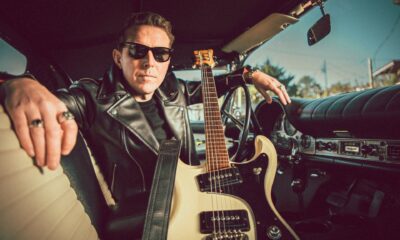
 Alternative/Rock1 week ago
Alternative/Rock1 week agoWilliam Edward Thompson Premieres His Stripped-Down “Sleep Test” Music Video
-
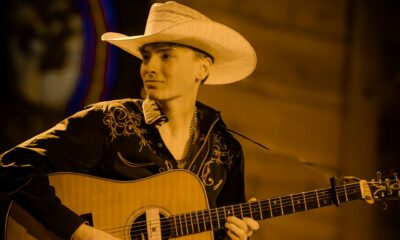
 Country1 week ago
Country1 week agoJayce Turley Reflects on “Misery” with the Premiere of His New Single
-
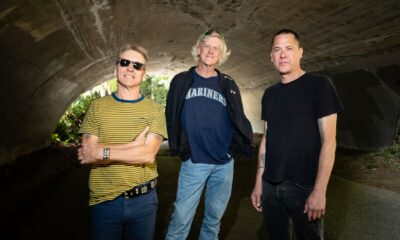
 Hardcore/Punk6 days ago
Hardcore/Punk6 days agoSpiders from Uranus Premieres Their Debut Album ‘Blow It Out!’


